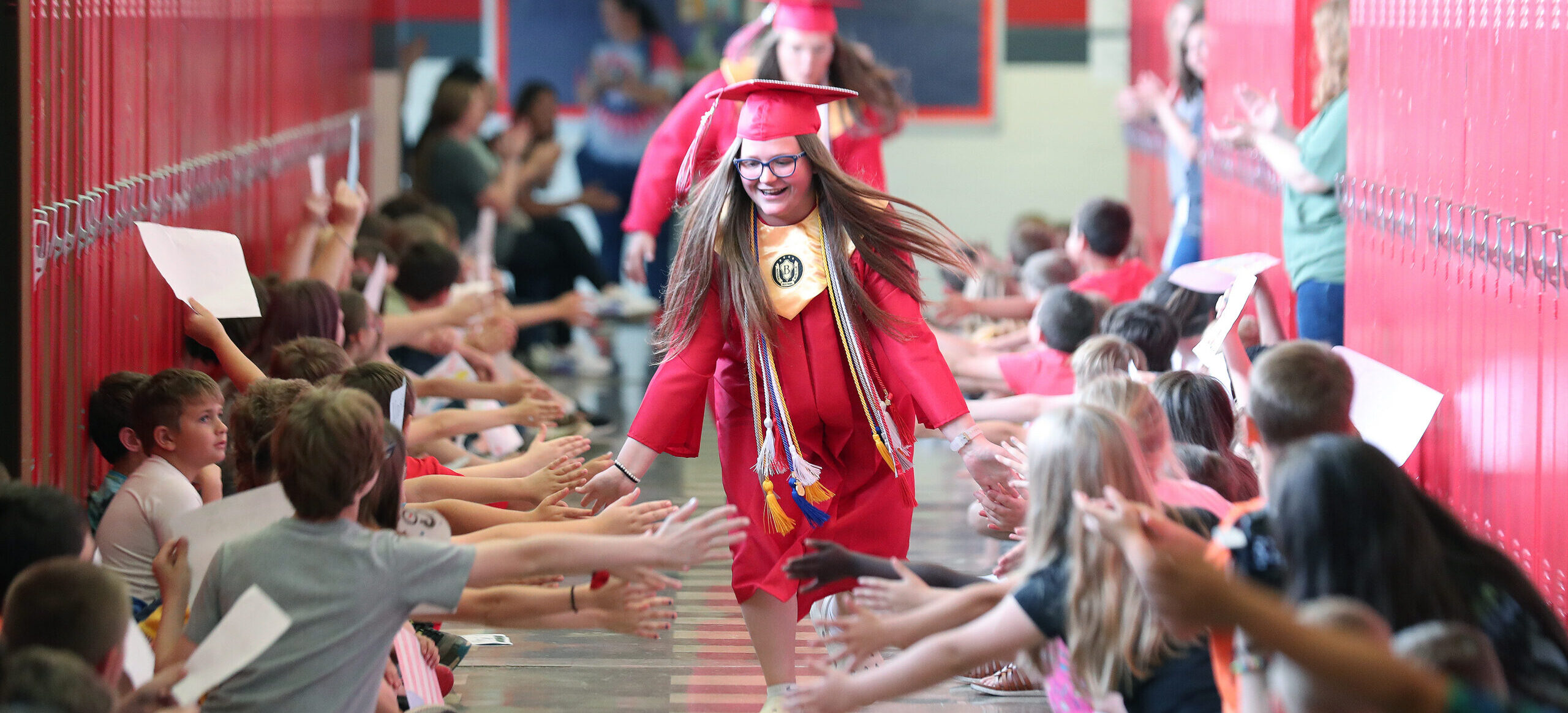We live in a culture where “breaking ties” is a key part of growing up and exploring the world. Young people are expected to rebel from families so they can “find themselves.” They must “find their own way,” and so they need adults to “back off” and “give them space.”
There is some truth behind this conventional wisdom. As students move through middle school and high school, they are actively internalizing a sense of who they are as unique individuals and how they will present themselves and leave their mark in the world. They need to find their own voice and discover who they are, their gifts and their passions.
At the same time, that growing and discovery process is most successful when it transpires while young people maintain strong relationships with parents, teachers, mentors, coaches and other trustworthy adults (not to mention positive friendships with peers). Important people in young people’s lives not only offer mirrors and sounding boards for self-reflection, they can also introduce young people to people, places, vocations, cultures and ideas that capture their imagination, expand their thinking and open possibilities for their future.
Expanding Possibilities For Students
Teachers and other school staff play an important and unique role in expanding possibilities for students. They often have access to opportunities and ideas that the student may not think of or that the student’s family may not have experienced. They also can sometimes see possibilities in a young person that may not be obvious to families and friends who may have preconceptions of who a young person is or what possibilities they have for the future.
In many ways, the goal of education is to open up new possibilities for students through introducing and developing mastery in new ideas, literature or fields. In addition, a diverse body of research highlights the importance of strong relationships in helping students discover the possibilities that fit them and gives them the courage to explore those possibilities.
Close Relationships Help Youth Thrive in Adversity and Seek New Opportunities
Young people who have strong relationships are better equipped to pursue goals that take them out of their comfort zone. Researchers have found that close relationships provide a safe haven as a source of strength for youth. They also are a source of encouragement to create or seize opportunities. Support and encouragement weave together to give young people courage to step into new possibilities for growth and discovery.
Dependable Support to Make Exploring Safe |
Encouragement to Expand Possibilities |
Strong relationships give young people a “secure base” from which to explore by..
|
Strong relationships encourage youth to explore and expand possibilities by…
|
School Staff Can Empower Students By Opening Access to New Possibilities
Students succeed with the support of a network of trustworthy relationships in their lives. Teachers and other school staff play a key role in this network by connecting students to resources and opportunities.
In particular, students from low-income and minority families often benefit greatly from this support, as it widens their knowledge on navigating educational environments and imagining future possibilities, particularly if they live in neighborhoods and families that have not exposed them to the broader world.
A close relationship with a teacher, for example, can help shape a student’s goals for the future. Positive relationships with teachers and other school staff increase the likelihood that students will attach to their school, giving students confidence in knowing where to go if they are struggling or if they wish to explore additional academic opportunities.
Students Can Bridge the Gap into Adulthood Through Guidance from Teachers
As they transition into adulthood, students greatly benefit from adults who can teach them how to thrive as an adult. These contacts provide them with necessary information on how diverse adult worlds function, along with how to access opportunities. This information can be lost when the child-adult relationship is not based on mutual respect, however.
Teachers have an opportunity to build meaningful relationships with their students and model an expectation of mutual respect throughout the school year. With this foundation, students are more likely to be receptive to guidance on becoming a healthy and productive adult.
The Presence of Sparks in Young People’s Lives
One important way to encourage young people to expand possibilities for their future is to learn about their interests, passions or “sparks.” After learning what makes that student spark, connect them with people and activities that help them explore those interests. When teachers know their students’ interests and values, they can incorporate them into lessons to increase the relevance of content and spark interest. All students benefit from this approach by being exposed to different ideas.
Most young people can tell what their “sparks” are (though 38 percent said they don’t know). Most can talk about things they’re at least curious about. These were the most common sparks among 15-year-olds when they were asked in a national study to identify just one spark:
Many Potential Adult Guides and Allies
One important way to help young people discover expanded possibilities or opportunities for their future is for them to connect with adults who either share their interests or who can point them toward opportunities that might fit them and their goals for the future.
Through these relationships, young people not only are introduced to new options, but they also see themselves through other people’s eyes. Unfortunately, too many young people do not have access to a strong network of trustworthy adults beyond their families. These positive adult relationships can include:
- Extended family members
- Teachers, counselors and other school staff
- Coaches, employers and mentors
- Religious leaders, volunteers or participants
- Youth program staff and volunteers
In the end, the specific type of relationship (whether a teacher or a neighbor) is less important than the quality of that relationship. What matters to young people is that the relationship is real and that the person takes an interest in them and wants the best for them. Many different trustworthy adults can play those roles in young people’s lives.
Introducing Students to Other Places and Cultures
When students are introduced to the world around them through the school curriculum, they are better equipped to engage and develop responsible roles in society. Part of expanding possibilities for students is to introduce them to other places and cultures, tapping their curiosity and deepening their learning about others — and, in the process, themselves.
Teachers can expand possibilities for students by:
- Exposing them to a wide variety of materials from different backgrounds.
- Creating learning activities to explore similarities and differences across and within cultures and groups in an open, reflective and respectful way.
- Having students design projects that encourage them to incorporate material that is culturally relevant to their lives.
- Encourage all students to discover more about themselves and teach the teacher what they know from their own backgrounds, cultures and experiences.
- Create an environment where students feel comfortable sharing their lives and ideas with each other during classroom activities.
Students share what they have learned with each other then grow in understanding and appreciation of cultures different than their own. Researchers have found that exposing students to other cultures and ideas increases their overall level of learning.
Developing Culturally Responsive Relationships
Classroom lessons and activities can be structured to be more responsive to students’ cultures and lives. As a result, students become more engaged.
- Focus on fostering positive bonds with all students, even those who may be challenging. Engage these students by asking them about something they are interested in.
- Learn about students’ lives. Ask them to tell stories and to use their personal experiences to enrich their learning — and the whole class’ experience.
- Talk to students in a manner that does not demean their age, lack of experience or background.
- As you learn about students’ interests, experiences and strengths, tap these to stimulate new learning and to connect subject matter to their lives.
- Integrate your course’s curriculum with material that is relevant to students’ lives. Help students see connections between what they are learning in the classroom and what they dream of for their future.
- Use student-centered stories, vocabulary and language when introducing complex ideas.
- Encourage dialogue and discussion among students, shifting the focus from teacher-centered instruction to student-centered inquiry as much as possible.
- Create an environment where students can think critically about assumptions and bias in texts and media — and in their own lives.
- Adapt your teaching to the way students learn best.
- Ask students to share aspects of their lives in connection to what they are learning throughout the school year.
- Ask students what they are most curious about as they look forward to adulthood. Structure activities and projects that explore these topics.
Jostens partnered with Search Institute to provide research-based data and advice for dealing with common school challenges. Over the past 30 years, Search Institute has studied the strengths and difficulties in the lives of more than five million middle and high school youth across the country and around the world to understand what kids need in order to succeed. Like Jostens Renaissance, Search Institute focuses on young people’s strengths, rather than emphasizing their problems or deficiencies. Visit SearchInstitute.org to learn more.
Click the button below to download and print the full guide which includes class activities, statistics and research around expanding possibilities for students.
WANT TO USE JOSTENS RENAISSANCE?
If you are a Jostens customer and you need a login to access all the resources on JostensRenaissance.com, email your rep or click here.
If you don’t currently partner with Jostens for yearbooks or graduation regalia or other celebratory products, you can learn more here.


